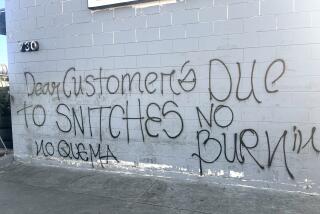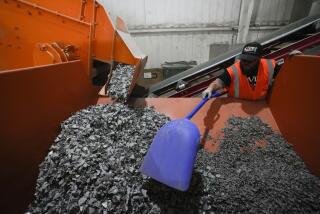For Recyclers, a Silver Lining in the Treads
- Share via
MECCA, Calif. — The Firestone tire recall, an operation that could cost $500 million, has spawned its own trickle-down economy, carrying ripples out to everyone from Native Americans who run a desert recycling station to a Garden Grove tire hauler working so much overtime that he has nearly doubled his weekly paycheck.
The Cabazon Band of Mission Indians said Friday that it has reached a deal to accept almost 5,000 Firestone tires a day for the next year from dealers across the Southwest. The tribe will grind the tires into crumbs at a plant near Mecca, east of Palm Springs. The crumbs will be turned into asphalt, playground surfaces and floor mats.
The deal appears to be the biggest yet resulting from the national panic to unload possibly flawed tires--a stampede that has created a sudden and very large pile of trash, and a cottage industry to get rid of it.
Bridgestone/Firestone Inc. last month voluntarily recalled 6.5 million tires in the United States, used mainly on Ford Explorers, because their treads could peel off. Regulators are investigating reports that the tires may be linked to 69 traffic deaths.
Eventually, experts estimate, millions more tires could be involved--a substantial addition to the estimated 275 million that are dumped, burned or recycled in the United States and Canada each year. The Cabazon deal and others could help answer a nagging question: Just what will happen to all those tires?
Thousands of them will go from driveways to car dealers to tire haulers to Los Angeles-based Rubber Technology International, where the recall has galvanized the 4-year-old company’s business.
Like the Cabazon operation, RTI grinds up used tires and turns the chunks into everything from traffic cones to garden hoses. The company expects the number of tires it handles to nearly double, from 55,000 in July to 100,000 in September--almost entirely because of the recall, said President and CEO Trevor Webb.
Most of the additional tires are coming from Ford Motor Co. and Firestone dealers across Southern California. Webb has rented a tire-shredding machine called a rasper for $10,000 a month.
Because stored tires create fire and health hazards, state regulators allow him to keep just 30,000 at a time in his Washington Boulevard yard. Tires are stacking up so fast that Webb is running his rented rasper 19 hours a day--almost twice as much as he did before the recall.
“These are unfortunate circumstances,” Webb said. “But for our business, it’s great. I hate to say that. But it’s true.”
Also benefiting from the surge in business is a company called Redwolf, based in East Los Angeles. The company picks up the recalled tires, for $1 apiece, and delivers them to Webb. Redwolf pays Webb about 45 cents each to take the tires, thus making about 55 cents for every tire delivered.
Owner Vernon Redwolf has hired three extra drivers, and all of his drivers are working at least six days a week.
One of them is 18-year-old Manuel Figueroa, whose paycheck-to-paycheck life has suddenly changed dramatically.
With overtime because of the Firestone recall, his pay has jumped from $400 a week to $700--and that means he can afford to stock up on diapers for his 3-week-old daughter, Alissa, and give a little extra cash to his girlfriend.
“It started slowly, and then it just came up on us,” Figueroa said. “Now it’s exploded. Business is good. There are a lot of tires out there.”
Before the recall, Redwolf picked up about 7,000 tires a week from car and tire dealers for disposal. These days, the company is picking up 17,000 a week.
Redwolf used to sort through the tires he picked up and sell the good ones to used-tire stores. “Not any more; I don’t have time to sell them,” he said. “Before this, there were days when we didn’t have anything to do. Now, we’re working seven days a week, we’re backed up and we can’t take any more accounts. We’re swamped.”
Tribe Cashes In With Recycling
The biggest recipient of the Ford tires so far, apparently, is the 42-person Cabazon Band. The tribe, which also owns a casino, has set aside 590 acres of its desert reservation for an “eco-industrial park,” which includes First Nation Recovery Inc., the only tire-recycling facility in the country owned and operated by Native Americans.
On Friday on the reservation, about 30 miles southeast of Palm Springs but a world away from the desert’s ritzy resorts, First Nation General Manager Dan Swanson pulled out a pocketknife and sliced through a blue plastic seal covering the lock of an unmarked tractor trailer.
He flung open the doors of the truck--the first of four that would arrive at the reservation that day--revealing 1,250 spanking new Firestone tires.
The truck backed up to the recycling warehouse and the tires were tossed onto a conveyor belt, which carried them into a shredding machine that moaned and groaned before spitting out chunks of rubber. By the end of the day, those chunks of rubber, with fragments of steel removed by magnets, had been reduced to fine, clean crumbs to be shipped to manufacturers of various rubber products.
First Nation is being paid $20 per ton to take the Firestone tires, and will further profit by selling the recycled rubber. If the contract lasts for a year, it will be worth about $368,000 just for taking the tires.
It is the largest contract ever signed by First Nation Recovery, but it is unclear how much the deal will be worth overall. Tim Bent, Firestone’s senior environmental manager, disputed experts’ projections that the number of tires affected by the recall could soar beyond 6.5 million, and he said the deal with the Cabazons may not last a full year because the recall may be over by then.
“The sooner the better, obviously, from our perspective,” Bent said.
He said Firestone is “actively seeking” other deals, similar to the one struck with the Cabazons, that would help handle the sudden flood of tires.
He said the company is trying to make the best of the situation by making sure that as many of the recalled tires as possible are recycled. After tires have been piled in a dump, they carry contaminants that make them difficult, and too expensive, to recycle.
Firestone has based a four-person security team on the reservation to make sure that none of the tires leave intact. The tires are also slashed before they arrive, and Firestone offers $10 to any recycling worker who finds one undamaged.
Making Good Things From Bad Tires
Operations like First Nation and RTI will turn Firestone’s recalled tires into materials for a variety of products:
* An asphalt blend that is softer than traditional pavement, making it quieter, more durable in harsh weather and easier on cars.
* Playground surfaces, running tracks, equestrian arenas and basketball courts.
* Garden hoses, favored by some gardeners because tire rubber is already treated to repel ultraviolet light--which means the hoses last longer in the sun.
Business is also booming at the Quantum Group, a Tustin-based incubator for technology that allows businesses like RTI to find new ways to reuse tire rubber.
For example, because of the recall, Quantum President and CEO Ehrenfried Liebich is moving full speed ahead with a new technology to produce new tires from used tires. The method had been on the back burner.
The sudden rush of tires, he said, means that companies are already lining up to buy his $500,000, 50-ton machines, which will now be ready in two months.
Liebich said he expects the numbers of tires affected by the recall to soar even more because drivers with tires similar to the recalled ones will get rid of them to alleviate any safety concerns--even if they can’t get Firestone to pay for it.
“Everything is moving at a much more rapid pace,” Liebich said. “All of a sudden, we are in the right place at the right time.”
More to Read
Inside the business of entertainment
The Wide Shot brings you news, analysis and insights on everything from streaming wars to production — and what it all means for the future.
You may occasionally receive promotional content from the Los Angeles Times.









